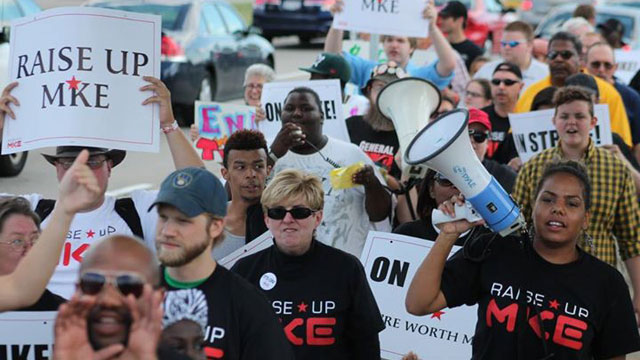
Jennifer Epps-Addison (with bullhorn) leads a march of striking fast-food and retail workers and community supporters in Milwaukee on August 29, 2013, a nationwide day of strikes in more than 60 cities across the country.
Historian and author Peter Dreier recently sat down with Bill to discuss the new generation of activists agitating for progress as our political infrastructure remains gridlocked. At BillMoyers.com, Dreier profiled 19 who he sees as leaders on the front lines of today’s social movements. We reached out to viewers on Facebook, Twitter and BillMoyers.com and asked for nominations of local activists you admire to round out Dreier’s list. We’re grateful for the hundreds of responses we received. One person in particular stood out — Jennifer Epps-Addison — so we’ve named her our 20th activist to watch.
Over the past 15 years, Jennifer Epps-Addison has organized a number of successful campaigns on a variety of economic and social justice issues in Wisconsin. “The work that I’ve focused on centers around passing policies that keep workers and their families at the center,” Epps-Addison said.
In 2009, she led the charge for Milwaukee’s MORE ordinance, which established that 40 percent of all construction jobs on publicly funded projects would go to city residents. Last year, she led a campaign to pass the Milwaukee Jobs Act, which created entry-level construction opportunities for unemployed city residents. She also championed paid sick days as well as in-state tuition for all state colleges for undocumented immigrants.
Epps-Addison says that in her work organizing low-wage employees, she has met many people with two or three jobs who still can’t afford to see a doctor and are forced to rely on public assistance. “That is not the America that I was raised to believe in,” she says.
When she was growing up, Epps-Addison says, America was still investing in its middle class and her own family was an example of the benefits of this investment. Her father was the son of a sharecropper from the South and her grandmother started picking cotton at the age of five, leaving school after the sixth grade. Her grandmother later moved to Milwaukee and worked in a factory.
“She was on public assistance, which provided a stable enough life for my dad so he could focus on school. She was never rich but she was able to send her son to law school. This country invested in them … but at some point we decided that we were going to subsidize corporations. We see record profits in the fast food and retail industries, for example, but workers are falling farther and farther behind.”
Currently, Epps-Addison is leading a coalition of community groups, labor unions and elected officials who are working to raise wages and standards for Wisconsin workers. She is also the vice president of the Milwaukee Workers Organizing Committee (MWOC), a recently established low-wage workers union.
Epps-Addison took on a new job in September as executive director of Wisconsin Jobs Now, a nonprofit that focuses on improving workers’ wages and working conditions. Before community organizing, she worked as an attorney for the Milwaukee Trial Office of the Wisconsin state public defender.
Epps-Addison says she still believes in the American dream and that everyone should have an opportunity to pursue it. But, she says, much work needs to be done: “I believe that my generation has a responsibility to reclaim this country and our democracy.” Thankfully, activists and leaders like Epps-Addison are pushing for that.
Here are some other activists who caught our eye:
Madison Kimrey is a 12-year-old who is fighting for voting rights in North Carolina. See her in action firing back at Gov. Pat McCrory (R-NC) after he called her a prop because she accused him of voter suppression for signing a voter identification law that stripped pre-registration rights from young people.
Max Kenner is founder and executive director of The Bard Prison Initiative (BPI) which he setup in 1999 to give incarcerated men and women the opportunity to earn a Bard College degree while serving their sentences. To date, Bard has granted nearly 275 degrees to program participants and enrolled more than 500 students.
Alexis Goldstein left her career on Wall Street in 2010 and joined the Occupy Wall Street movement. Goldstein, who writes for The Nation about her experiences, was a co-author of Occupy the SEC’s 325-page comment letter to financial regulators urging them to institute a strong Volcker Rule, which aims to end conflicts of interest between bankers and their customers.


